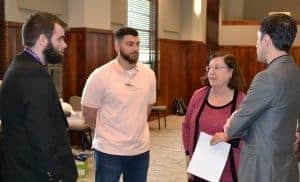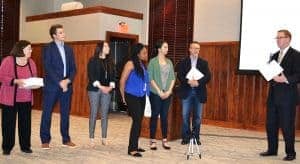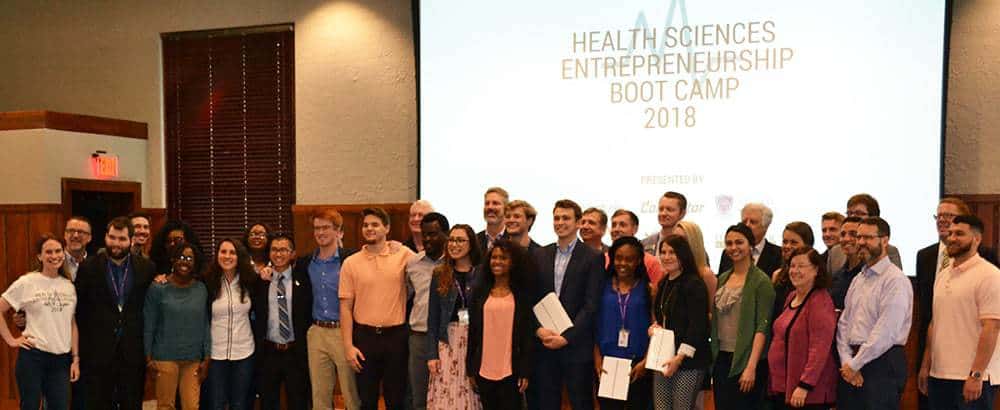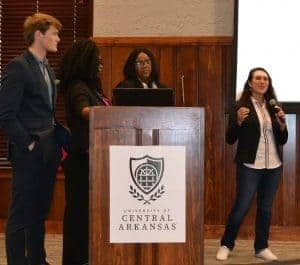Health Sciences Boot Camp Helps Students Get Started on Startups
| June 6, 2018 | Just as academic years at Arkansas colleges and universities were winding down in May, 17 undergraduate and graduate students were starting up at the third annual Health Sciences Entrepreneurship Boot Camp on the University of Central Arkansas campus in Conway.

Nancy Gray, Ph.D., director of BioVentures third from left,, visits with some of the students at the conclusion of the Boot Camp.
The boot camp from May 20-25 was a joint initiative of the University of Arkansas for Medical Sciences (UAMS), Arkansas INBRE, BioVentures and The Conductor, a public-private partnership with UCA and Startup Junkie. Arkansas INBRE (IDeA Networks of Biomedical Research Excellence) helps build research infrastructure across the state.
Split up into five teams of three to four students each, each team was charged with coming up with a business proposal and presenting it May 25 to a three-judge panel as part of a final competition. The judges were Lawrence Cornett, Ph.D., UAMS vice chancellor for research; Jay Gandy, Ph.D., chair of the Department of Environmental and Occupational Health in the UAMS College of Public Health; and Matthew Troup, Conway Regional Medical Center CEO and president.
Ideas ranged from a new type of clinical, protective gown that can be quickly put on and help combat staph infection and contamination to an app to find gluten-free restaurants that have been certified gluten-free by a medical professional.

The four members of the Uber Rx learn from the Boot Camp judges that they have won the business proposal competition.
The winner was a four-person team, Uber Rx. The proposed Uber Rx would be a service for the delivery of medications directly to patients before discharge from a hospital or clinic. To ensure patients better comply with taking medications, it would coordinate between hospitals, pharmacies and patients and follow up with patients after discharge to make sure they’re adhering to a medication plan.
“I didn’t expect to win but it made the hard work pay off,” said Kyle Fouts, an Uber Rx team member and recent Arkansas State University graduate. “I’m familiar with some of what we were learning at the boot camp regarding health sciences, but I feel like I learned more about entrepreneurship. I was expecting to learn here and network, and I did both. I met a lot of great mentors.”
The curriculum is designed to give them knowledge and tools they need to think critically, learn entrepreneurial principles and launch innovative ventures. Additionally, the camp offers leadership, team building and other recreational experiences.
The first class at UAMS had 14 graduate students and post-docs. Two of the students started their own companies. Last year, the boot camp had 18 students from 10 schools. Two teams went on to compete in the 2017 Donald W. Reynolds Governor’s Cup collegiate business plan competition and one won the $25,000 top prize.
“We’re looking forward to this class being as successful as the last,” said Nancy Gray, Ph.D., head of BioVentures. “You’ve got a huge reputation to live up to.”
Even though the judges singled out Uber Rx as the winner, all the teams earned the panel’s high regard.
“The judges were fairly unanimous in saying that you’ve all received an honorable mention,” said Jeff Standridge, chief catalyst for the Conductor. “The quality of the research, the quality of the problem statements you presented. You hit on important issues in health care and the process you followed.”
Maximilian de Kunffy is an Arkansas State University student majoring in homeland security and national disaster preparedness. He said he had little exposure to entrepreneurship or health sciences beforehand, but he came to the boot camp wanting to learn about both.
“It’s tough to define what entrepreneurship really means,” de Kunffy said. “This boot camp helped us do that. It’s about new ways of thinking about problems in the health sciences industry. That’s probably the biggest thing I am taking home with me.”

